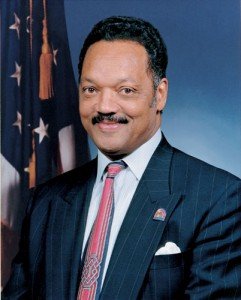The Growing Racial Wage Gap
Jesse Jackson | 2/9/2018, 7:32 a.m.
President Donald Trump keeps boasting about the low black unemployment rate, although African-Americans still suffer nearly twice the unemployment rate as whites do.
What Trump never mentions is the growing racial wealth gap: the economic disparity between whites and people of color that plagues this country. The statistics from the Federal Reserve are clear. Median black household net worth -- what assets the black households in the middle have after subtracting debts -- is $17,600. That of the typical white household is nearly 10 times greater at $171,000.
The reason for this shocking disparity is clear. As an economic letter from authors of the Federal Reserve Bank of San Francisco notes, "For the past several decades, black workers have fared worse than white workers in the U.S. labor market. Despite government policies designed to reduce or eliminate racial disparities, black workers continue to experience lower wages and higher unemployment rates than Whites. Black workers still earn less than their white counterparts in a worsening trend that holds true even after accounting for differences in age, education, job type, and geography."
Trump is trumpeting rising wages but in the first year of the Trump administration, the median weekly earnings of African-Americans went down, not up, when adjusted for inflation.
Forty-five percent of black families own homes, compared to 73 percent of white families. African-Americans were the hardest hit by the financial collapse, in part because banks targeted the worst liar's loans to African-American and Latino families, assuring them that they could refinance when the value of their homes rose. When the bottom fell out, the families found themselves underwater, and bankers, like current Treasury Secretary Steve Mnuchin, then made big bucks foreclosing on the victims.
The measure of this, as the report Foreclosed details, can be seen in the fact that the wealth of African-American families had recovered to its pre-crash level by 2016 -- not counting the value of their homes. But the average home equity for African-Americans was still $16,700 less. The very working and middle class families that reached to buy a home were still struggling to get back to where they were in 2007. Over the same period -- from 2007 to 2016, the average wealth of the top 1 percent increased by a mere $4.9 million.
The Affordable Care Act (Obamacare) is far from a perfect health care plan, but it did allow African-Americans to lower the number of uninsured among the non-elderly by 1.8 million. Trump and Republican efforts to repeal Obamacare and to throw millions off Medicaid will disproportionately hurt African-Americans and Latinos.
Inequality is still getting worse. As the Pew Research Center reports, the typical wealth of upper-income families was seven times that of middle income families in 2016, a gap that has doubled since 1983. Similarly, upper-income families have 75 times the wealth of lower-income families in 2016, compared with 28 times the wealth in 1983. And African-American and Latino families are disproportionately more likely to be among the low income families.
Trump is not to blame for this disparity, just as he is not the reason for current low unemployment rates. The question is what will the administration do going forward?
This week, I will travel to New York where the Rainbow Push Wall Street project will convene bankers, religious and civil rights leaders, economists and union leaders to discuss the growing racial wealth gap. We will explore how the workers' pension funds -- from universities, from unions, from public employees, from churches -- could be used safely to green line the neighborhoods that are too often red-lined. With federal guarantees, real investment could rebuild neighborhoods, seed small businesses, build affordable housing and create jobs.
With the tax cut projected to add more than $1 trillion to the deficit over a decade, the Republican-led Congress is looking to slash, not expand, federal support for working and poor people and impoverished rural and urban communities. With federal guarantees and more independent pension fund management, new capital for vital investments might be freed up.
If Trump were serious about dealing with the wealth gap, he would be leading this discussion, not ignoring it.
You can write to the Rev. Jesse Jackson in care of this newspaper or by email at jjackson@rainbowpush.org. Follow him on Twitter @RevJJackson.
Share this story online at stylemagazine.com.




